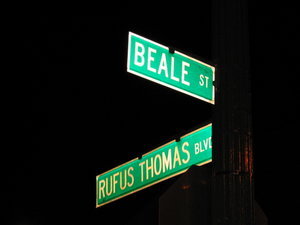Advertisement
Published: October 13th 2008
[youtube=A9gO59ooAA8]

 Beale St. & Rufus Thomas Blvd.
Beale St. & Rufus Thomas Blvd.
Memphis honors a city legend where it all began, on Beale St. "Bear Cat" by Rufus Thomas, "Three O'Clock Blues" by B.B. King, and "How Many More Years" & "Howlin' Wolf Boogie" by Howlin' Wolf
Suggested Food and Drink for this Entry: No food. Just a smooth drink of Courvoisier.
Although Beale Street was created in 1841, it's influence on the American music scene began in 1905 when musician W.C. Handy moved to Beale St. from Clarksdale, Mississippi. At the time, Beale St. was the most prominent gathering place for African Americans in the country. Also at the time, Memphis was one of the most violent and crime ridden cities in the country. In 1910, a white politician, E.C. Crump, ran for mayor as a reformer against the ingrained corrupt Memphis political machine. Believing the black vote was the key to Crump's election. the Crump campaign hired W.C. Handy to write a campaign song that would appeal to black voters. This song, titled "Mr. Crump", would be the basis for Handy's later composition "The Memphis Blues", which became a major hit at the time. Handy later went on to write classics such as "The St. Louis Blues" and "The Beale Street Blues". In 1918, Handy moved

 W.C. Handy Himself
W.C. Handy Himself
W.C. Handy Statue on Beale St.to Chicago, but a Memphis musical legend had been born and Beale St. was set in place as the center of the black community in the Mid-South.
The music created by Handy during this period led to him being given the nickname, "The Father of the Blues". Although he did not invent the blues, Handy is given credit for merging the folk blues of the south with the instrumentation used in European music and being the first blues musician to write sheet music.
Throughout the 20's, 30's, 40's and 50's, Beale St. remained a hub for black culture and music. Beale St.'s influence on the culture and music of the area increased in October 1948 when Memphis radio statio WDIA began broadcasting programming aimed solely at the black community. The stations owners hired local icon Nat D. Williams as the south's first black disc jockey. Following Williams' hiring, the station brought in additional DJ's and performers, including Rufus Thomas, B.B. Kings and Bobby "Blue" Bland." While King and Bland eventually left Memphis as their careers expanded, Thomas stayed in Memphis thoughout his career. In 1953, Thomas recorded the first hit released by Sun Records, "Bear Cat". Sun founder
Sam Phillips wrote the song as an answer song to Big Mama Thornton's original version of "Hound Dog". The song rose to #3 on the R&B charts. In the early 60's, Thomas had some of the earliest hits released on the Stax label, including "The Dog". "Walkin' the Dog","Funky Chicken" and several funk-dance songs followed. Thomas continued to record and perform until shortly before his death in 2001.
Rufus Thomas appeared in several documentaries on the music of Memphis and his performance of "Funky Chicken" at Wattstax in 1972 can be seen in the 1973 movie
Wattstax, a clip of which is available below. It's a classic.
In the 1960's, Beale Street became run down and many businesses closed. In the 1980's, plans were inacted to revitalize Beale Street. Today, Beale Street and the allure of its past are used as means to pull in tourists and convention goers to the downtown area. And, with that crowd comes the homogeneous air seen in most big cities that attempt to use a revitalized historic district to increase the city's profile. Becuase of that, now only some of Beale Street's buildings give a glimpse of its past. Gone are any true businesses from Beale Street. What remains are souvenier shops and a multitude of bars and clubs where out of towners can go in search of a good time.
Advertisement
Tot: 0.121s; Tpl: 0.012s; cc: 12; qc: 50; dbt: 0.053s; 1; m:domysql w:travelblog (10.17.0.13); sld: 1;
; mem: 1.1mb

 Beale St. & Rufus Thomas Blvd.
Beale St. & Rufus Thomas Blvd.
 W.C. Handy Himself
W.C. Handy Himself
mk
non-member comment
Mmm, funky chicken
1. The fact that I just had to Google "Courvoisier" means I need to get out more, I think. 2. The stuff about W.C. Handy writing a campaign song for a white politico is fascinating. 3. You should think about embedding YouTube clips of some of the songs you're referencing. Or, if the platform allows it, streaming some mp3's.